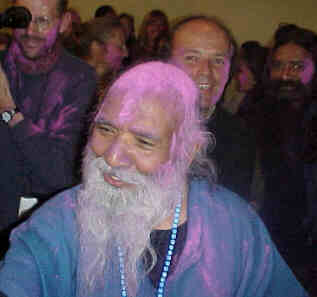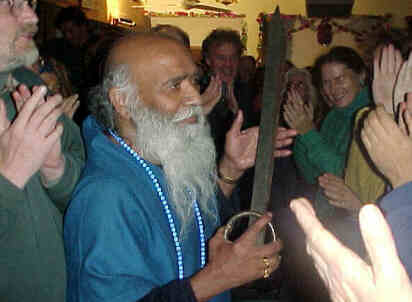Holi - Weakness to Be Eliminated,
Joy to
Become the Reality!
Swami Shyam celebrates the festival of Holi, traditionally marked by songs, festivities and the custom of face painting. Excerpts:
There is something within a human being
which slowly makes him or her affected by weakness. And then the human being
slowly dies, like dry  wood.
So today, that weakness is to be burnt or eliminated so that the sense of delight,
joy and friendliness may become the reality.
wood.
So today, that weakness is to be burnt or eliminated so that the sense of delight,
joy and friendliness may become the reality.
"Today, everyone feels whole. There is no gap between rich and poor, elder and younger. This festival is to eliminate the sense of difference.
So check: which is the space where old is not, young is not, black is not, white is not, rich is not, poor is not? You will find that when you close the eyes. That is the essence. It is the sense or knowledge with which you can watch your breathing."
[At this point, Swami-ji led the group into meditation, asking them to simply watch the breath without repeating mantra and without holding any thought. "We should know we are just the Space," he said.]
Festival of Holi: "Day of delight." This is the basant utsav (Spring festival) where everybody gets mad with delight. Holi is the play of life with the life. It came into being when human beings came to know what is the result of delight and what is the result of hatred. So they came to the side of playing, and of playing Holi.
Here in India everything (the moon, the mountains, the stars, the rivers) is placed such that you like to be one with the nature. People become friendly with the rivers, the mountains and with food. The origin of the tradition of colours
This day is the day of deligh t – that food
is coming to our home. So food is first offered to the nature. The first food
is offered. It’s burnt in a fire; it turns into smoke, the smoke rises
to the clouds, the clouds shower on the earth. And when it rains, the food
returns to fertilise the fields. So man becomes surrendered to the nature.
The offering of the food was the Holika utsav – and that was
the beginning of the delight.
t – that food
is coming to our home. So food is first offered to the nature. The first food
is offered. It’s burnt in a fire; it turns into smoke, the smoke rises
to the clouds, the clouds shower on the earth. And when it rains, the food
returns to fertilise the fields. So man becomes surrendered to the nature.
The offering of the food was the Holika utsav – and that was
the beginning of the delight.
Later on, many more things were added to it. Some demoniac force was added, and people got frightened. So people said, A demoniac witch will pick you up and eat you if you are all neat and clean. So people will advise you to cover yourself with dust, with colours, so you won’t look appetising to the witch. So people make themselves wet and throw colours on each other.
So it was on this day that Prahalaad was on the stroll and he saw a kitten emerge alive from the potter’s oven because he had faith in Raam. And in his excitement Prahalaad began to sing, Raam, Raam, Raam, Raam, and began throwing the dust, the colours. Then the parties began to grow, and wherever the boy traveled the party grew and the people were singing,Raam, Raam, Raam, Raam. And they were throwing the dust.
But the lad’s father, the king, got angry because he did not believe in Raam. And he threatened to punish the boy. But the boy kept singing, Raam, Raam, Raam, Raam. Whenever your soul is tuned in to the highest, you become fearless! The king said he’d throw the boy in front of the lion if he didn’t stop singing. But the boy kept singing. The king was enraged, so Prahalaad was thrown to the lion. And the lion was fierce because he had been kept hungry and hadn’t eaten for days. So he roared! But instead of attacking the boy, the lion licked his feet. And still the boy sang, Raam, Raam, Raam, Raam.'
The king was still angry, and he threatened to take the lad to the top of a mountain and throw him off if he didn’t stop. But the lad kept singing, Raam, Raam, Raam, Raam. So he was thrown. But the banana leaves saved him, and still the boy sang.
Finally they built a fire, a very big fire that burnt all night. And they threw Prahalaad on the fire. In the night, everything was burnt, but Prahalaad came out alive still singing, Raam, Raam, Raam, Raam. And then the king was so angry that he took his own sword, and had Prahalaad tied to a couple of pillars, like Samson and Delilah’s pillars. But before he struck his son he asked the boy, What has happened to your eyes?
"Nothing, except that I see Raam everywhere."
"Everywhere?"
"Yes."
"Do you see him in me?"
"Yes."
"Do you see him in these pillars?"
"Yes."
The king was completely enraged. Now, the king was blessed by a boon that he could not be killed inside or outside, he could not be killed by man or beast. But he was standing with Prahalaad in a place with those pillars. And the moment he raised his sword to strike, the Lord himself manifested as a half-man, half-lion and roared. And he ripped the king with his claws.
And that is the effect of prayer.
[At the end of the evening, there was singing, and Swami-ji tossed purple powder on everyone, then went around and smeared everyone’s face with brightly-coloured paint, and gave out ladoos (food offerings). Much laughter and clapping and singing.]
We began, we were quiet. We played for two and a half hours and we were all in joy. But we could live these moments of love and joy because of the sense of love and cooperation. There was no sense of otherness. There was complete dissolution of the sense of otherness – which will rise again when we leave this room. [Laughter]
Copyright © 1999-2005 International
Meditation Institute. All Rights Reserved